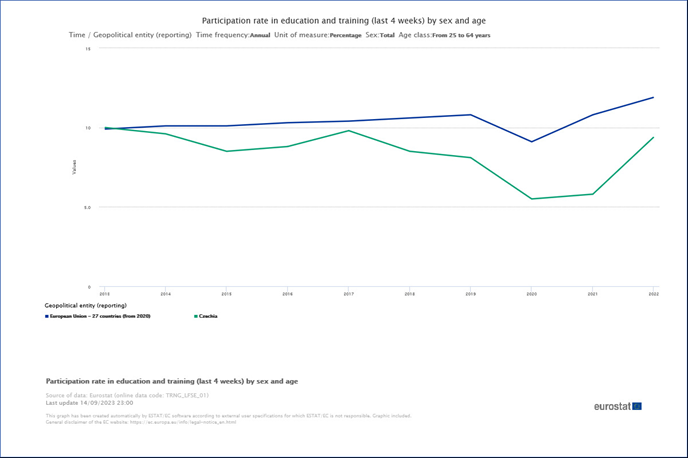Address
Czech National Agency for International Education and Research
Dům zahraniční spolupráce
Na Poříčí 1035/4
CZ-110 00 Praha 1
Tel: +420 221 850 618
E-Mail: eurydice@dzs.cz
Website
Overview
The nature and scope of adult education is determined mainly by socio-cultural, economic and political factors. A substantial role is played not only by an educational status of the population or the needs of the national economy and the labour market, but also by the extent to which these needs are reflected in valid legislation, public administration, the school system, and how they are perceived by employers and citizens themselves.
The main reason for an increasing importance of further education is the need to acquire new knowledge and new skills arising from the necessity of continuing adaptation to changing life conditions, both in working and private spheres. The most significant part of the educational activities is related to work; however, improving one's knowledge and skills in an area of personal interest is also a frequent motive for participation in further education.
According to the results of the Labour Force Survey, the participation rates in further education have fluctuated slightly in the last period. While there has been an apparent increasing tendency within the EU28 since 2013, in Czechia the participation rates have been unstable and remained below the EU average (see the picture below).
Participation rates (%) of adult population in further education in EU and Czechia in the period 2013-2022

Source: Eurostat
Adult learning is an integral part of lifelong learning and covers all areas of education, both in professional education and in the development of general skills or leisure activities. Like other areas of lifelong learning, adult learning can be also divided into formal, non-formal and informal.
Further education and vocational training is provided by schools and higher education institutions (vysoké školy), employer organisations, public administration and self-government bodies and their educational institutions, non-profit and non-governmental organisations, including professional and commercial entities. (For details, see Providers of further education.)
Under the Act No.179/2006, on Verification and Recognition of Further Education Results and on the Amendment to Some Other Acts, applicants have an option to verify their knowledge and skills acquired outside formal education (e.g. through various courses, self-study, practical training etc.).
The adult education area is covered by a number of different national strategic documents and regulations.
